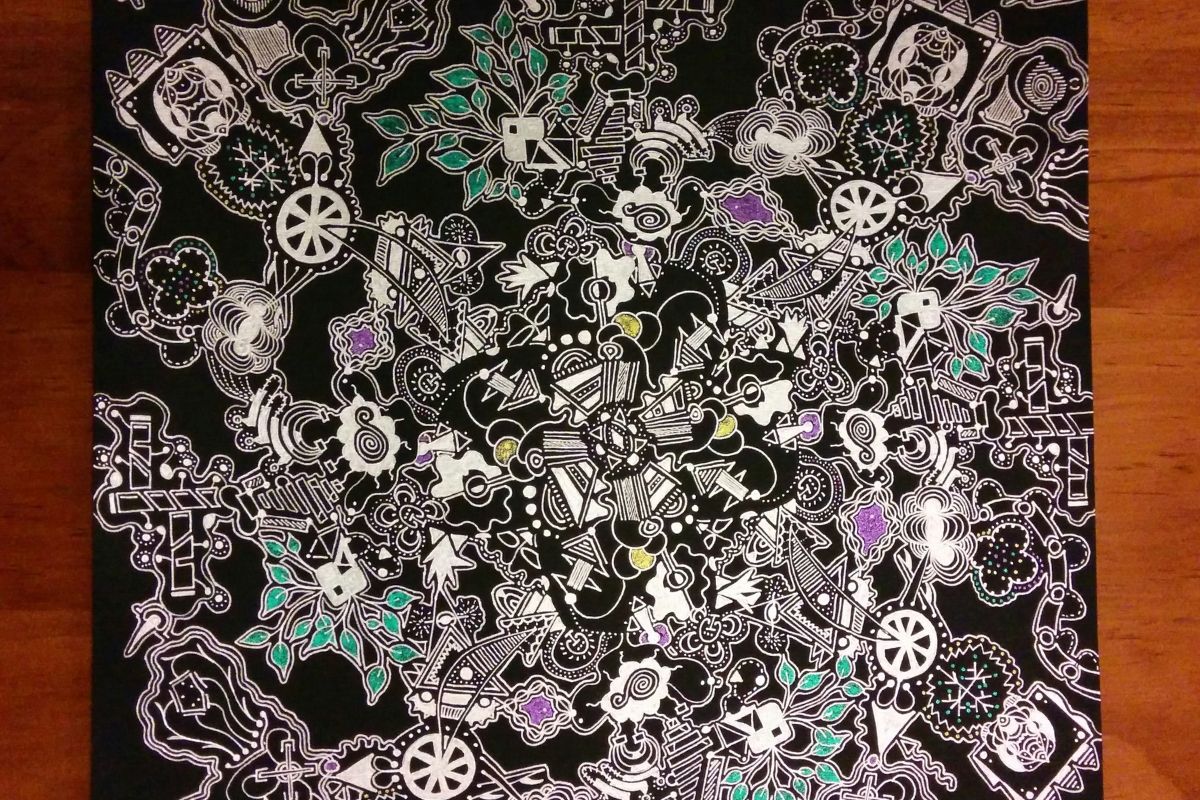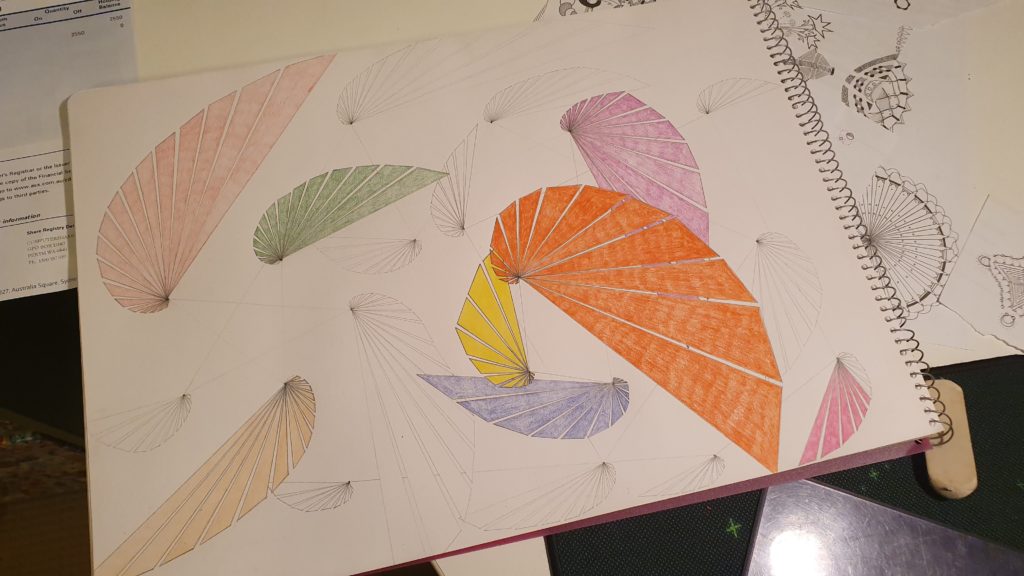
I find art, particularly doing art, is quite healing. I tend to do more art during difficult times in my life.

Healing activities like art deliver their benefits via a number of routes. They provide good distraction from difficult thoughts or feelings. They can act as mindfulness activities where our attention is clear and focused and in the moment. Producing something feels like an achievement. You get to work with your hands. These are tangible benefits built into the art process itself.
Another way that art can heal is that we can derive from the process of doing art, metaphors that help us understand our lives more broadly.
The type of art that I do, which is generally geometric shapes and designs, requires both patience and precision. When I do art, I am reminded of the value of both of these in everyday life.
Patience
I don’t consider myself as having any real artistic gift or talent.
My art is 2 dimensional and constructed on the basis of simple geometric rules and the additional of detail over time.
My art benefits more from patiently adding detail and colour over time, than it does from any particular skillful flair.
Patience is central to my process of doing art. I often start pieces without really knowing what I want the end point to be – how I want it to look. I have to be patient as the design reveals itself. It may take weeks before the final form of the drawing presents itself to me. In the meantime, I simply need to trust that it will happen, and focus in on adding small details, one at a time.
Modern life doesn’t really celebrate patience. We want what we want, when we want it. The outcome is priority, not the pathway to the outcome. We get frustrated if we have to wait for something, if we have to put work into something.
Yet paradoxically, my experience is often that the anticipation of something is often more energising and rewarding than the thing itself. The journey to a goal is more enjoyable than the feeling of having achieved the goal. All the experiences I had during my years of study were just as rewarding as having the degree itself.
I am not suggesting the outcome isn’t important, but rather that impatiently waiting for it to arrive and forgetting to enjoy the moment are lost opportunities.
Thus, patience to me is not just the willingness to wait for an outcome, but also:
- having faith that the outcome will probably be better than if it were provided straight away (because whatever it is has been cooking longer)
- taking the opportunity to enjoy all the experiences that lead to the desired outcome
So regardless of what it is you are working towards (degree, job, money etc), ask yourself if you are willing to wait for it to happen and whether you can enjoy, as much as possible, all the steps that will take you to that outcome.
Precision
My art consists of geometric shapes and repeated patterns.
They are sometimes quite detailed and thus require a fair degree of precision.
Precision is “the quality, condition, or fact of being exact and accurate”.
I think of precision as both an outcome (the final product is exact and accurate) but also an attitude or approach. It is the latter that I think is a worthwhile metaphor for life.
When one commits to doing something in a precise manner, it encourages them to slow down, take their time, and be careful and deliberate with what they are doing. Things are done more mindfully. Errors or mistakes are identified and corrected quickly. Colouring in within the lines in the picture above requires me to work slowly, use a consistently sharpened pencil, and use small deliberate strokes. Whilst this might take more time, the rewards are a better quality product and a more relaxed, serene experience.
Precision is something you can bring to just about any task. If you are listening to a friend talk, you can really focus in on what they are saying and take the time to make sure you really understand what they are saying. If you are working on an assignment, you can take the time to assemble and thoroughly read/summarise the relevant references. Even sending an email can be approached in a precise way – focusing on concise wording and clear communication. You can approach any task with the intention of giving it your full attention and doing it as precisely as possible.
The opposite to a precise approach is one that is haphazard and distracted. I suspect that I spend a great deal of my time doing things in such a way. For example, multi-tasking kills precision because you are sacrificing the attention paid to each task, in order to (supposedly) get more done. Leaving things until the last minute means we are doing things rushed, without the appropriate attention to detail. Fitting in a lot in your day can come at the expense of doing any of those things well.
The precision required to do my art reminds me such precision is highly valuable in other areas of life also.
Precision does mean allocating a suitable amount of time to each task that you take on. I used to start each day with a big to-do list. It would leave me feeling rushed and I wouldn’t allocate appropriate time and energy to each task. Since limiting my daily to-do list to 3 big items, I find I allocate appropriate time to each (and typically have spare time left over to complete another couple of tasks). From a study perspective, you may need to get used to starting pieces of work earlier and allocating more time to them.
Both require you to relax your iron grip on time
Life is short and we want to achieve as much as possible in the time we have.
As a result we can become quite obsessed with time. I’ve written about this before.
Both patience and precision require you to try and let go of thoughts like ‘I don’t have time’ or ‘I’ve got too much to do’. These lead to impatience and the tendency to rush through and between activities. The goal is to try and replace these thoughts with something along the lines of ‘all I need to do is get started on each of my tasks, do them deliberately and carefully, and trust that good outcomes will follow’.
Patience and precision also require to you to focus less on the outcome and more on the process of getting to that outcome – ‘I will get there eventually and I am going to try to just enjoy the moment and do my best work’. With art, I learned that often the outcome I expected (or originally wanted) was not the one I got, but that I was happy with the outcome anyway. I’ve found this paralleled in life also.
To achieve greater patience and precision you may need to reconsider how you’ve allocated your time across different tasks and projects. If you are constantly in a rush, it is difficult to cultivate patience and precision. Maybe you need to put some tasks or projects on the backburner and exercise some patience in knowing that you will get to them eventually. Maybe you need to practice doing one task at a time, so you discover the benefits of precisely focusing in on a single task.
The reward of patience and precision are not that you get more time or that you necessarily get more done, but rather that you reorient yourself to the here and now, not get stuck always thinking about the future.

